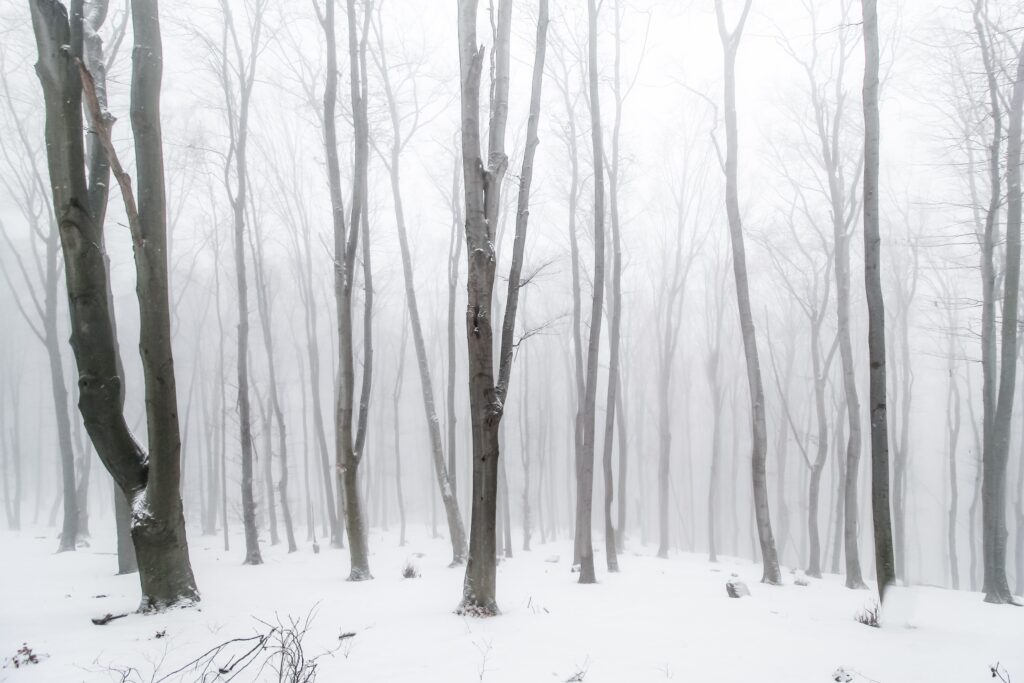
Everything Will Sink into Darkness and Vanish

Drive Your Plow over the Bones of the Dead
本文有轻微剧透,但不涉及犯罪主线,请谨慎阅读。
有些作家和你有缘。读这本书的契机是诺奖宣布前几个小时我随手立的一面flag,已经很久没有以这么「命中注定」的方式从想读里抽书出来了。
不同于已经出版中译本的两部长篇,这本是一篇情节简单的犯罪小说,应该并不是Olga最好的作品,犯罪故事和手法并非天衣无缝,既不难读也不难懂,在这类作品中更为偏重文学性,也讨论了世界观和生命观,重点是动物的生命伦理,但可能囿于情节,谈得并不好,立场太过于黑白分明,缺乏对立面的信息,角度也有些单薄。行文中也顺带提到了其他议题,比如女性地位、社会关系、边缘人群。
不知是语言、译者还是写作时间的原因,《太古和其他的时间》的语气跳跃而朴实,而这本《靡骨之壤》的语气更为沉稳和狡黠,可能作者人到中年更能把握中老年女性的心态,也少了很多探索心理深度和文学技巧的花哨心思,如此一来倒是显得《靡骨之壤》更为坦诚、朴素和直接,在话题的广度和深度上没有《太古》那么大的雄心。
语言上最令人印象深刻的是景物的铺陈,每每写景都十分有画面感——孤寂、广袤、荒芜的雪原,叙述不疾不徐娓娓道来,像一幅画轴缓缓展开。在感觉上虽然还没有到《都柏林人》那样浑然一体严丝合缝的排他式境界,但背景、氛围和情绪也称得上和谐得当。Olga写不同形态和触感的风雪,不同时间和季节的光线,森林里各种动物和植物,观察敏锐,下笔温情脉脉。Duszejko本来是一位开铃木武士(最好去搜一下图,以免像我一样全程对车抱有错误的想象)的硬核老阿姨,能爬上爬下修屋顶倒水泥,积极倡导和维护动物权利,经常义愤填膺和义正辞严地发表长篇大论,结果一转到景色就暴露了细腻而敏感的内心,这种感觉很像是我最喜欢的写Oddball的一段:他平时是个寡言少语的硬汉,却选了个爱心形纸模给Duszejko做了咖啡拉花。
最直击人心的景物描写并不是覆雪的荒原,而是一段街景。春天行迹刚至,街上行人面容苍白,双眼迷离,取钱、看戏、看医生、去墓地放鲜花,各自奔忙。这时心理活动登场,Duszejko忽然感到与路人产生了强有力的联结,同作为人类,都如此渺小,脆弱,短暂,无法永生,前路黯淡,爱的人会离去,回忆会消散,只留下衣橱里的几件衣服和照片上的影像;人类活在对不幸和恐惧的严防死守里。春天将至未至,城里一地冬天留下的混乱泥泞,这时人们对春天抱有急切和躁动的期待,可是环境仍然充满残酷的敌意,将要吞噬这一丝微茫的火光。类似对《三体》最后太阳系命运的观感,这种对生命和希望的毁灭令人窒息又有现实感,非常动人。拥有一副心肠的作家不少,悲悯的段落也见了很多,会突然被这种关怀击中,可能就是因为这种直白又真实的动人。
Duszejko的世界观是由宇宙、恒星、行星主导的,相信性格和命运是由出生那一刻天体的位置决定,毫不相信自由意志。她试图用星盘解释周围人的行为和遭遇,也用行星的动态作为生活的指南,星空下发生的一切都由星空主宰,是她的世界观。本来我以为这只是设定或小说有趣的味觉层次,但看到最后中世纪占星师的故事,我才明白这并非被动接受已经写好的命运,而是是主动顺服——一旦认定预兆,就会屈从它哪怕最微小的迹象,把生命献祭给信仰。很难说这种执行方式是对占星的怀疑,还是最发自内心的认同。木屋的女作家说我们生活在自己编织的世界里,自己定义意义和价值,一生挣扎在自己的建构里,而每个人造出了不同的建筑,所以难以相互理解。Duszejko和Dizzy在占星术上无法理解对方,Duszejko和社群中的大多数在动物伦理方面观点对立,彼此隔膜,互相嘶吼。对她自己而言,星空也是一张大网,使得她看不见其他可能,也看不见星空下的世界。
街景和心理的部分摘了三段:
The first feeble signs of spring hadn’t yet reached the town; it had probably settled in beyond city limits, in allotment gardens and in stream valleys, like enemy troops in the past. The cobblestones were covered in sand left over from the winter, when it was scattered on the slippery pavements, but now, in the Sunshine, it was raising dust, soiling the springtime shoes brought out of the closet. The town flower beds were small and miserable. The lawns were fouled with dog dirt. Along the streets walked ashen people, squinting. They looked stupefied. Some were queuing at the cash machines to withdraw twenty zlotys to pay for today’s food. Others were hurrying to the clinic, armed with a ticket for an appointment at one thirty-five, while others were on their way to the cemetery to change the plastic winter flowers for real spring daffodils.
I felt deeply moved by all this human hustle and bustle. Sometimes an emotional mood of this kind assails me—I think it’s to do with my Ailments—and my resistance weakens. I stopped in the sloping market square, and gradually I felt flooded by a powerful sense of communion with the people passing by. Each man was my brother and each woman my sister. We were so very much alike. So fragile, impermanent, and easily destroyed. We trustingly went to and fro beneath the sky, which had nothing good in store for us.
Spring is just a short interlude, after which the mighty armies of death advance; they’re already besieging the city walls. We live in a state of siege. If one takes a close look at each fragment of a moment, one might choke with terror. Within our bodies disintegration inexorably advances; soon we shall fall sick and die. Our loved ones will leave us, the memory of them will dissolve in the tumult; nothing will remain. Just a few clothes in the wardrobe and someone in a photograph, no longer recognized. The most precious memories will dissipate. Everything will sink into darkness and vanish.
Photo by Valentin Salja on Unsplash